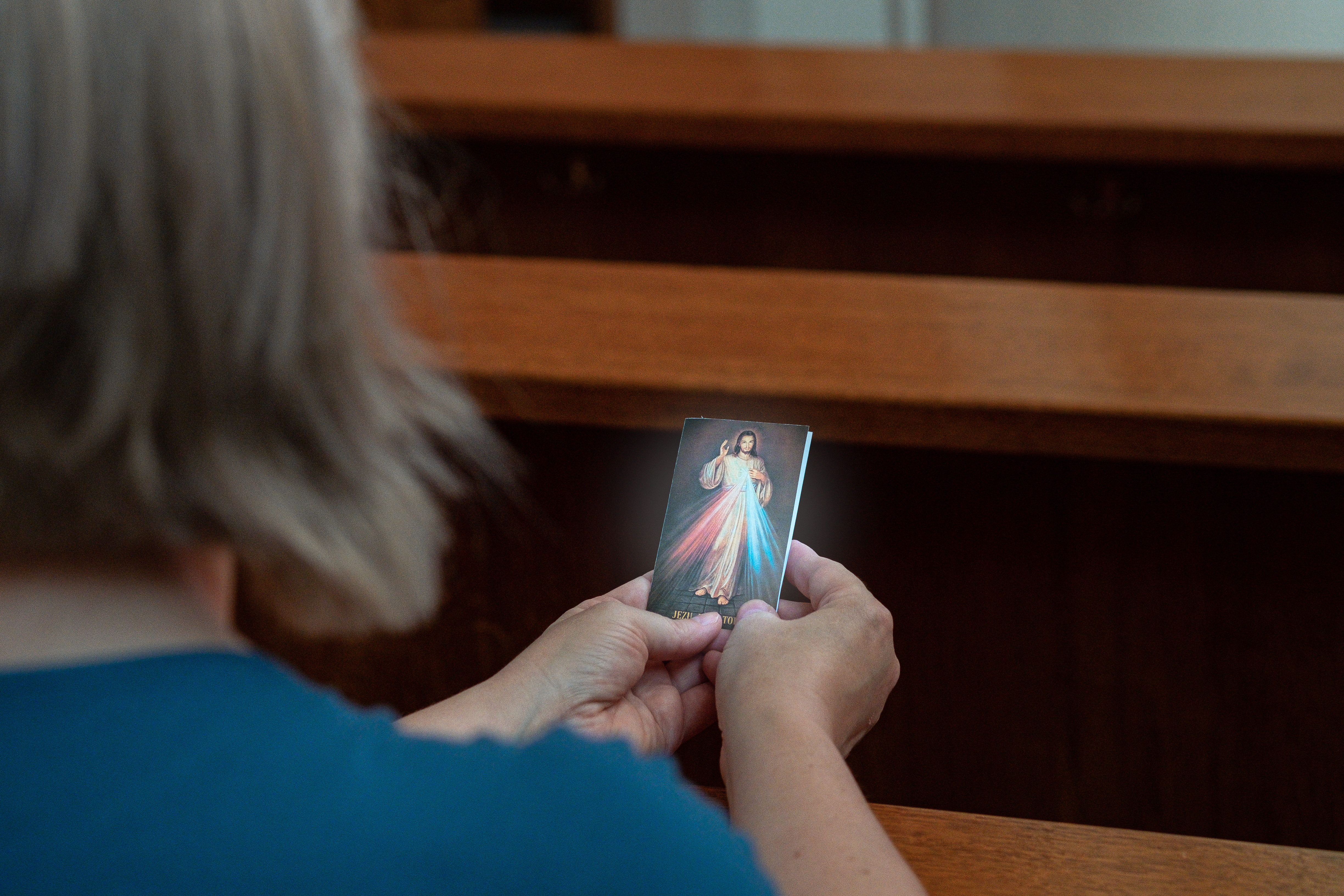Have you ever heard anyone say that the Lord told them this or the Lord told them that and you wondered if it was true or even possible? I assure you that it is possible. Holy discernment is required to know whether it was the Lord or not. The way we can tell is to do it, and then look back. You’ll know right away whether it was the Lord or not.
I remember when I was a lay jail minister, I was in a cell on Saturday night with about 15 men. I mentioned hearing the Lord’s voice with some instruction. They all said, the Lord never talks to me! I suggested that perhaps they were not listening. I told them they needed to be quiet to hear the voice of God. Jail is a very noisy place. It’s almost impossible to be quiet. The language is foul and conversation topics can be also. They seemed to be eager to learn more that evening. I suggested they do their best to hear what God was saying to them.
When I came back the following Saturday, I couldn’t believe their reactions. They could hardly wait to tell me about what they had heard! They told me things that they really felt the Lord was saying to them. One of them told me about a lunch hour where one of the guys would always sit in the corner by himself. He was rejected by the group day after day. He was “different”. But the man telling me the story felt strongly that the Lord was calling him to go sit with him at lunch. He knew that he would take a lot of abuse from the other guys for doing it, but God’s voice was so strong that he was willing to take the abuse. Wow! What a testimony!
In today’s reading, Zechariah refused to believe the message from God that his wife would bear a son. The Lord told him to name his newborn son John. Zechariah became mute due to his disbelief. But, when the time came for his son’s circumcision, Zechariah asked for a tablet to write down his newborn son’s name. He wrote, “John”. The people were astounded because there was no such name in his family. Don’t forget that nine months had gone by before this happened. Zechariah had carried that name in his heart the whole time. As soon as he revealed the name, he began to speak and exclaimed the Canticle of Zechariah. His joy was overflowing!
Hearing the voice of God is not complex. God speaks to those who speak to Him. We must really believe that we are His son or daughter as a result of baptism. By being immersed in prayer, attending Mass on Sunday, reading and meditating on Scripture, and doing our best to have a close relationship with the Lord, we can hear His voice.
So, find a quiet place. Show the Lord you want to go deeper into your relationship with him. Then, enjoy what happens next!
Serving With Joy!
¿Alguna vez has escuchado a alguien decir que el Señor les dijo esto o aquello y te preguntaste si era cierto o incluso posible? Te aseguro que sí es posible. Se requiere un santo discernimiento para saber si fue el Señor o no. La forma en que podemos saberlo es hacer lo que dijo y luego mirar hacia atrás. Sabrás de inmediato si fue el Señor o no.
Recuerdo que cuando era ministro laico en la cárcel, estaba en una celda el sábado por la noche con unos 15 hombres. Mencioné escuchar la voz del Señor con un poco de ayuda. Todos dijeron: ¡El Señor nunca me habla a mí! Sugerí que tal vez no estaban escuchando. Les dije que tenían que estar en silencio para escuchar la voz de Dios. La cárcel es un lugar muy ruidoso. Es casi imposible estar callado. El lenguaje es grosero y los temas de conversación también pueden serlo. Parecían ansiosos por aprender más esa noche. Les sugerí que hicieran el mejor intento de escuchar lo que Dios les estaba diciendo.
Cuando regresé el sábado siguiente, no podía creer sus reacciones. ¡No podían esperar para contarme lo que habían oído! Me dijeron cosas que realmente sentían que el Señor les estaba diciendo. Uno de ellos me habló de la hora de almuerzo en la que uno de los chicos siempre se sentaba solo en un rincón. Fue rechazado por el grupo día tras día porque era “diferente”. Pero el hombre que me contó la historia sintió fuertemente que el Señor lo estaba llamando a sentarse con él durante el almuerzo. Sabía que recibiría mucho abuso de los otros muchachos por hacerlo, pero la voz de Dios era tan fuerte que estaba dispuesto a aceptar el abuso. ¡Guau! ¡Qué testimonio tan increíble!
En la lectura de hoy, Zacarías se negó a creer el mensaje de Dios de que su esposa tendría un hijo. El Señor le dijo que le pusiera por nombre Juan a su hijo recién nacido. Zacarías quedó mudo debido a su incredulidad. Pero, cuando llegó el momento de la circuncisión de su hijo, Zacarías pidió una tablilla para escribir el nombre de su hijo recién nacido y escribió: “Juan”. La gente quedó asombrada porque no existía tal nombre en su familia. No olvides que habían pasado nueve meses antes de que esto sucediera. Zacarías había llevado ese nombre en su corazón todo el tiempo. Tan pronto como reveló el nombre, comenzó a hablar y exclamó el Cántico de Zacarías. ¡Su alegría era desbordante!
Escuchar la voz de Dios no es complejo. Dios habla a quienes le hablan. Realmente debemos creer que somos Su hijo o hija como resultado del bautismo. Al estar inmersos en la oración, asistir a Misa los domingos, leer y meditar en las Escrituras y hacer todo lo posible por tener una relación cercana con el Señor, podemos escuchar Su voz.
Así que, busca un lugar tranquilo. Muéstrale al Señor que quieres profundizar en tu relación con él. Y luego, ¡disfruta de lo que sucede a continuación!
¡Sirviendo con alegría!
 Deacon Dan Schneider is a retired general manager of industrial distributors. He and his wife Vicki have been married for over 50 years. They are the parents of eight children and thirty-one grandchildren. He has a degree in Family Life Education from Spring Arbor University. He was ordained a Permanent Deacon in 2002. He has a passion for working with engaged and married couples and his main ministry has been preparing couples for marriage.
Deacon Dan Schneider is a retired general manager of industrial distributors. He and his wife Vicki have been married for over 50 years. They are the parents of eight children and thirty-one grandchildren. He has a degree in Family Life Education from Spring Arbor University. He was ordained a Permanent Deacon in 2002. He has a passion for working with engaged and married couples and his main ministry has been preparing couples for marriage.
Featured Image Credit: J’Waye Covington, unsplash.com/photos/man-wearing-black-gray-and-white-plaid-sleeveless-top-5BrFcOXtgrE


 Susan Ciancio has a BA in psychology and a BA in sociology from the University of Notre Dame, with an MA in liberal studies from Indiana University. For the past 19 years, she has worked as a professional editor and writer, editing both fiction and nonfiction books, magazine articles, blogs, educational lessons, professional materials and website content. Thirteen of those years have been in the pro-life sector. Currently Susan freelances and writes weekly for HLI, edits for American Life League, and is the executive editor of Celebrate Life Magazine. She also serves as executive editor for the Culture of Life Studies Program—an educational nonprofit program for K-12 students. You can reach her at
Susan Ciancio has a BA in psychology and a BA in sociology from the University of Notre Dame, with an MA in liberal studies from Indiana University. For the past 19 years, she has worked as a professional editor and writer, editing both fiction and nonfiction books, magazine articles, blogs, educational lessons, professional materials and website content. Thirteen of those years have been in the pro-life sector. Currently Susan freelances and writes weekly for HLI, edits for American Life League, and is the executive editor of Celebrate Life Magazine. She also serves as executive editor for the Culture of Life Studies Program—an educational nonprofit program for K-12 students. You can reach her at 
 Kathryn Mulderink, MA, is married to Robert, Station Manager for Holy Family Radio. Together they have seven children (including Father Rob), and eight grandchildren. She is President of the local community of Secular Discalced Carmelites and has published five books and many articles. Over the last 30 years, she has worked as a teacher, headmistress, catechist, Pastoral Associate, and DRE, and as a writer and voice talent for Catholic Radio. Currently, she serves the Church by writing and speaking, and by collaborating with various parishes and to lead others to encounter Christ and engage their faith. Her website is
Kathryn Mulderink, MA, is married to Robert, Station Manager for Holy Family Radio. Together they have seven children (including Father Rob), and eight grandchildren. She is President of the local community of Secular Discalced Carmelites and has published five books and many articles. Over the last 30 years, she has worked as a teacher, headmistress, catechist, Pastoral Associate, and DRE, and as a writer and voice talent for Catholic Radio. Currently, she serves the Church by writing and speaking, and by collaborating with various parishes and to lead others to encounter Christ and engage their faith. Her website is 
 Mike Karpus is a regular guy. He grew up in Michigan’s Upper Peninsula, graduated from Michigan State University and works as an editor. He is married to a Catholic school principal, raised two daughters who became Catholic school teachers at points in their careers, and now relishes his two grandchildren, including the older one who is fascinated with learning about his faith. He also has served on a Catholic school board, a pastoral council and a parish stewardship committee. He currently is a lector at Mass, a Knight of Columbus, Adult Faith Formation Committee member and a board member of the local Habitat for Humanity organization. But mostly he’s a regular guy.
Mike Karpus is a regular guy. He grew up in Michigan’s Upper Peninsula, graduated from Michigan State University and works as an editor. He is married to a Catholic school principal, raised two daughters who became Catholic school teachers at points in their careers, and now relishes his two grandchildren, including the older one who is fascinated with learning about his faith. He also has served on a Catholic school board, a pastoral council and a parish stewardship committee. He currently is a lector at Mass, a Knight of Columbus, Adult Faith Formation Committee member and a board member of the local Habitat for Humanity organization. But mostly he’s a regular guy.


 A lover of Jesus Christ, a wife, and a mother of five,
A lover of Jesus Christ, a wife, and a mother of five, 


 Heather Orlowski and her husband are busy parents of two little girls (ages 2 and 4). The Catholic Church holds a special place in her heart and in her entire life. She attended Catholic schools from Kindergarten through college. She graduated from Aquinas College with a degree in Elementary/Special Education. Catholic Education is very important to her and she now teaches 1st and 2nd grades at St. Therese Catholic School. In her free time, she loves creating memories with her family and watching her little girls play soccer.
Heather Orlowski and her husband are busy parents of two little girls (ages 2 and 4). The Catholic Church holds a special place in her heart and in her entire life. She attended Catholic schools from Kindergarten through college. She graduated from Aquinas College with a degree in Elementary/Special Education. Catholic Education is very important to her and she now teaches 1st and 2nd grades at St. Therese Catholic School. In her free time, she loves creating memories with her family and watching her little girls play soccer. 
 Dr. Alexis Dallara-Marsh is a board-certified neurologist who practices in Bergen County, NJ. She is a wife to her best friend, Akeem, and a mother of two little ones on Earth and two others in heaven above.
Dr. Alexis Dallara-Marsh is a board-certified neurologist who practices in Bergen County, NJ. She is a wife to her best friend, Akeem, and a mother of two little ones on Earth and two others in heaven above.


 Merridith Frediani loves words and is delighted by good sentences. She also loves Lake Michigan, dahlias, the first sip of hot coffee in the morning, millennials, and playing Sheepshead with her husband and three kids. She writes for Catholic Mom, Diocesan.com, and her local Catholic Herald. Her first book Draw Close to Jesus: A Woman’s Guide to Adoration is available at Our Sunday Visitor and Amazon. You can learn more at
Merridith Frediani loves words and is delighted by good sentences. She also loves Lake Michigan, dahlias, the first sip of hot coffee in the morning, millennials, and playing Sheepshead with her husband and three kids. She writes for Catholic Mom, Diocesan.com, and her local Catholic Herald. Her first book Draw Close to Jesus: A Woman’s Guide to Adoration is available at Our Sunday Visitor and Amazon. You can learn more at 

